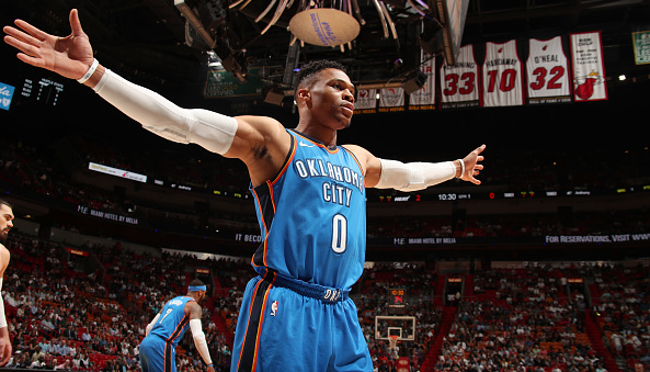
The Oklahoma City Thunder have been (very) busy since July 1. First, the club pulled off something approaching a miracle in convincing Paul George to eschew other options in favor of a long-term deal to stay in Oklahoma City. From there, the Thunder also invested in Jerami Grant (on a large, multi-year salary), Nerlens Noel (on a bargain deal), and Raymond Felton to build out a roster that is certainly more interesting than it was at the end of the 2017-2018 season.
However, most of the deep-dive NBA talk surrounding the Thunder right now revolves around the financial implications involved in all of their maneuvers. In short, Oklahoma City’s current roster would provide its ownership group with the largest luxury tax bill in the history of the NBA.
Oklahoma City crosses an historic threshold as the first $300M team in salary and projected luxury tax with the Raymond Felton signing. The Thunder now have a tax bill of $150M.
— Bobby Marks (@BobbyMarks42) July 4, 2018
Without plunging too deep into the specifics, the Thunder would be a “repeater tax” team next season, resulting in more punitive dollar-for-dollar penalties for each level it spends above the luxury tax. Given the massive deals for Russell Westbrook and Steven Adams (in addition to George), there is almost no scenario in which Oklahoma City could avoid the tax altogether and, at the moment, the contracts for Grant, Andre Roberson, Carmelo Anthony, and others push things into a stratosphere never before seen.
However, there are easy ways for OKC to slash some of their bill, and the biggest one would be to part ways with Anthony. While the numbers are clearly astronomical in any permutation, the most beneficial thing for the Thunder would be to shed Anthony’s full salary via trade, although there is not a single NBA team currently equipped to take the veteran forward’s deal ($27.9 million for next season) without sending money back in the form of other contracts.
More likely is a move to provide Anthony with a buyout and, depending on the terms, the Thunder could then “stretch” his salary cap number over a three-year period (using the stretch provision) to potentially save more than $100 million (not a misprint) in combined salary and tax payments. The same sentiment could be applied to players like Kyle Singler or Patrick Patterson, though Oklahoma City’s cost savings would not be nearly as significant, given that both players are not as handsomely paid as Anthony and any use of the stretch option must be executed before Sept. 1.
Basketball arguments for hanging on to Anthony might be offered in various corners of the internet, but from a financial standpoint, it appears to be untenable for the Thunder (in a small market) to keep the high-profile forward around for next season. It remains to be seen what the next steps are for Oklahoma City, but salary cap wonks everywhere will be paying close attention.






